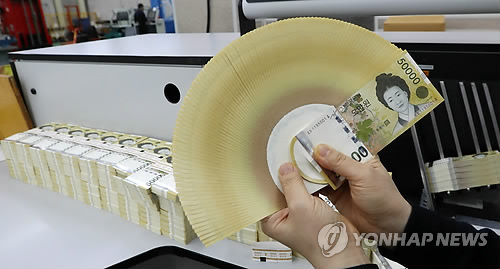The return of high denomination 50,000 won notes hit a four-year high early this year, the Bank of Korea (BOK) said Wednesday.
The central bank said it retrieved 4.59 trillion won ($4.06 billion) worth of the notes in the first quarter of this year, while printing 6.96 trillion won in new bills.
This represents a return rate of roughly 66 percent, up from 57.5 percent in the last three months of last year.
The return rate of the notes first issued in June 2009 has been on the decline since 2013 falling below the 50 percent mark in the early part of 2015. The central bank estimated that the total value of 50,000 won notes out in the market exceeds 78.1 trillion won.
 |
(Yonhap) |
In contrast, almost all of the country's 10,000 won and 1,000 won bills were retrieved.
The rise in the return rate is noteworthy because 50,000 won notes have been seen as forming the base of the country's so-called underground economy, which has been associated with bribes, tax avoidance and other shady dealings.
A 50,000 won note takes up much less space so more can be kept in private vaults and can more easily be handed over to another person.
Related to the change in the return rate, some in the BOK speculated that the enactment of the anti-graft Kim Young-ran Law last year, which makes it illegal for people in certain professions to accept expensive meals and gifts, may be reducing demand for the bills.
The bank's policy of giving favors, like issuing 10,000 won notes that are always in high demand, to financial institutions that return more 50,000 won notes may also be playing a part.
On the other hand, market observers said that while the return rate for the bill is low at present, things will change going forward.
They pointed out that the public tends to hold on to new high denomination notes when they are first issued, but this changes with time. (Yonhap)








